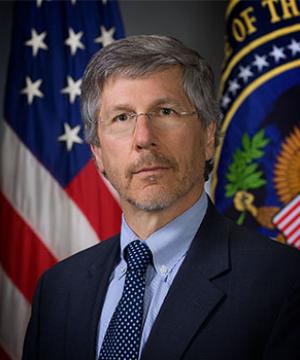Former Top Intelligence Official to Teach New Course
A former top intelligence official will be teaching at Columbia Law School this spring. Robert S. Litt, who served nearly a decade as the general counsel for the Office of the Director of National Intelligence (ODNI), is creating and co-teaching a new Intelligence Law seminar with Professor Matthew C. Waxman.
For Litt, who has participated previously in events at the Law School, teaching is a way to continue to engage publicly on cutting-edge national security and intelligence law matters. Speaking out on such issues was a major part of Litt’s job at ODNI—a responsibility he says emerged after Edward Snowden’s massive leak of national security documents in 2013.
“I had been talking to law students and legal conferences, but after Snowden, I ended up being tagged as the lead spokesman for the intelligence community,” recalls Litt, who served at ODNI from 2009 until 2017 and now works as of counsel at Morrison & Foerster in Washington, D.C. “That got me very much out in front.”
Litt’s role at ODNI, an agency that was formed after 9/11 to oversee the broader intelligence community, included public speeches and testimony before Congress. It also dovetailed nicely with his view that intelligence agencies should be more transparent about their practices.
“Public knowledge leads to public support and acceptance” of intelligence activities, he says.
Law schools rarely teach intelligence law, Litt and Waxman say, and when they do, the subject is often a smaller part of a broader national security law class. Columbia Law School’s course will dive deep into the “real-world dilemmas and pressures that governments wrestle with,” Waxman says, adding that “only a few lawyers in the country know this area as Bob does.” Topics will include surveillance, espionage, analysis of national security information, and covert action.
“This is a critically important area of the law,” says Waxman, the faculty chair of the National Security Law Program who has previously held senior positions at the State Department, Defense Department, and National Security Council. “How we regulate intelligence activities involves legal dilemmas at the heart of our democracy.”
Litt says he and Waxman are drawing up the syllabus “from scratch” and that the seminar will cover relevant case law, statutes, and executive orders, as well as public commentary and news stories. It will also focus on the balance between secrecy and transparency; security and privacy; and executive flexibility and institutional checks; in addition to the role of lawyers within government institutions.
“We want to give students a sense of what intelligence agencies do, what the legal and political frameworks surrounding those agencies are, and what practical and ethical problems lawyers working in that area face,” says Litt, a lecturer and an adjunct research scholar in the National Security Law Program.
Despite the mostly secretive nature of its business, the U.S. intelligence apparatus has been making headlines all year. Not only did intelligence agencies conclude Russia attempted to influence the 2016 election, but there was a security breach at the National Security Agency. And, the intelligence community has been a frequent target of President Trump (who tweeted last month, for instance, that the FBI’s reputation “is in tatters”).
Litt, who stayed on at ODNI until Trump’s inauguration in part because of the investigation into Russian meddling, says “cyber threats are an extremely significant” risk to U.S. national security. Meanwhile, although he concedes the president’s criticism “certainly can’t be beneficial to morale,” he says intelligence officials are “pretty professional.”
“I don’t think it’s going to affect how they do their work,” he says.
Litt’s own interest in national security law came during his second stint in government service. After previously working as an assistant U.S. attorney in the Southern District of New York and in private practice, he was named principal associate deputy attorney general under then-Deputy Attorney General Eric H. Holder, Jr. ’76. In that role, he reviewed Foreign Intelligence Surveillance Act applications and often represented the Department of Justice in the White House Situation Room on national security issues. Later, he maintained a security-related private practice, including representing CIA agents. At ODNI, after the Snowden leak, Litt helped push for greater transparency within the intelligence community, including declassification of certain information.
Despite those efforts, Litt takes a hard line against leaks, calling Snowden’s actions “unlawful.”
Citing Martin Luther King Jr.’s “Letter from a Birmingham Jail,” Litt says people who feel they are morally required to break the law “have to be prepared to take the consequences.” Snowden, he says, “has not been, to date.”
# # #
Published on January 17, 2018
